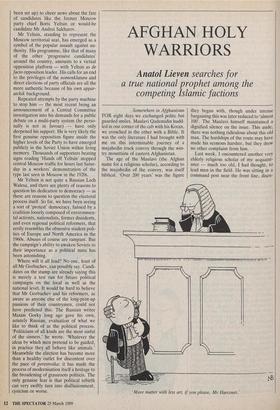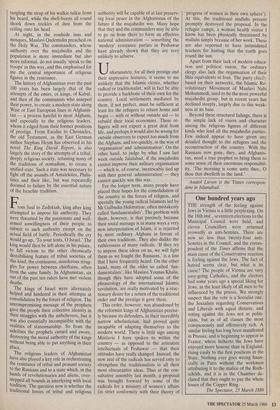AFGHAN HOLY WARRIORS
Anatol Lieven searches for
a true national prophet among the competing Islamic factions
Somewhere in Afghanistan FOR eight days we exchanged polite but guarded smiles. Maulavi Qademidin hudd- led in one corner of the cab with his Koran, we crouched in the other with a Bible. It was the only literature I had brought with me on this interminable journey of a mujahedin truck convoy through the win- try mountains of eastern Afghanistan.
The age of the Maulavi (the Afghan name for a religious scholar), according to the mujahedin of the convoy, was itself biblical. 'Over 200 years' was the figure they began with, though under intense bargaining this was later reduced to 'almost 100'. The Maulavi himself maintained a dignified silence on the issue. This aside, there was nothing ridiculous about this old man. The hardships of the route may have made his sermons harsher, but they drew no other complaint from him.
Last week, I encountered another very elderly religious scholar of my acquaint- ance — much too old, I had thought, to lead men in the field. He was sitting in a command post near the front line, disen- 'More matter with less art, if you please, Mr Harcourt.' tangling the strap of his walkie-talkie from his beard, while the shell-bursts all round shook down trickles of dust from the ceiling onto his head.
At night, in the roadside inns and mosques, Maulavi Qademidin preached on the Holy War. The commanders, whose authority over the mujahedin and the Population is more immediate but also more informal, do not usually 'speak to the troops' in this way, and this emphasised for me the central importance of religious figures in the resistance.
The history of Afghanistan over the past 100 years has been largely that of the attempts of the emirs, or kings, of Kabul, and then of the communists who usurped their power, to create a modern state along West or East European lines in Afghanis- tan — a process hateful to most Afghans, and especially to the religious leaders, whom it edged from their former positions of prestige. From Exodus to Chronicles, the old Testament, as the East German author Stephan Heym has observed in his novel The King David Report, is also largely the story of the attempts of a tribal, deeply religious society, retaining many of the traditions of nomadism, to create a unified state. Such a state was necessary to fight off the assaults of Amalekites, Philis- tines and their like, but was repeatedly doomed to failure by the essential nature Of the Israelite tradition.
From Saul to Zedekiah, king after king attempted to impose his authority. They were thwarted by the passionate and well- armed unwillingness of their people to submit to such authority except on the actual field of battle. Periodically the cry would go up, 'To your tents, 0 Israel.' The king would then be left alone in his palace, to fall victom to the other chronically destabilising feature of tribal societies of this kind; the continuous, murderous strug- gles for power between chieftains, often from the same family. In Afghanistan, six out of the past ten rulers have met violent deaths.
The kings of Israel were alternately helped and hindered in their attempts at consolidation by the forces of religion. The uncompromising message of the prophets gave the people their collective identity in their struggles with the unbelievers, but it was also essentially incompatible with the realities of statesmanship. So from the Sidelines the prophets cursed and swore, destroying the moral authority of the kings Without being able to put anything in their Place.
The religious leaders of Afghanistan have also played a key role in orchestrating the resistance of tribal and peasant society to the Russians and to a state which, in the hands of revolutionaries and aliens, over- stepped all bounds in interfering with local tradition. The question now is whether the traditional forces of tribal and religious authority will be capable of at last preserv- ing local peace in the Afghanistan of the future if the mujahedin win. Many hope that they and the commanders may be able to go on from there to form an effective national administration — something the 'modern' resistance parties in Peshawar have already shown that they are very unlikely to achieve.
Unfortunately, for all their prestige and their impressive features, it seems to me unlikely that the Islamic clerics, whether radical or traditionalist, will in fact be able to provide a backbone of their own for the country. Local settlements mediated by them, if not perfect, must be sufficient at least for the refugees to return home and begin — with or without outside aid — to rebuild their local economies. These re- fugees will not expect a great deal from life, and perhaps it would also be wrong for outside observers to expect too much from the Afghans, and too quickly, in the way of 'organisation' and 'administration'. On the other hand, to judge by what I saw last week outside Jalalabad, if the mujahedin cannot improve their military organisation — which is, of course, inextricably tied up with their general 'administration' — they cannot quickly win this war.
For the longer term, many people have placed their hopes for the consolidation of the country in the forces of religion, and specially the young radical Islamists led by Mr Gulbudin Hekmatyar, often mistakenly called 'fundamentalists'. The problem with them, however, is that precisely because their social message is in many ways a very new interpretation of Islam, it is rejected by most ordinary Afghans in favour of their own traditions. They also dislike the ruthlessness of many radicals. If they try to impose these ideas on us, we will fight them as we fought the Russians,' is a line that I have frequently heard. On the other hand, many of the older so called 'fun- damentalists', like Maulavi Younus Khalis, though ttley have adopted some of the phraseology of the international Islamic revolution, are really motivated by a reac- tionary desire for a return of the traditional order and the prestige it gave them.
This order, however, was abandoned by the reformist kings of Afghanistan precise- ly because its defenders, in their incredibly narrow scholasticism, had proved quite incapable of adapting themselves to the modern world. There is little sign among Maulavis I have spoken to within the country — as opposed to the articulate intellectuals of Peshawar — that their attitudes have really changed. Instead, the new zeal of the radicals has served only to strengthen the traditionalists in all their most obscurantist ideas. Thus at the con- sultative assembly last month, a proposal was brought forward by some of the radicals for a ministry of women's affairs (in strict conformity with their theory of 'progress of women in their own sphere'). At this, the traditional mullahs present promptly destroyed the proposal. In the refugee camps, a woman health visitor I know has been physically threatened by mullahs simply because of her work. These are also reported to have intimidated teachers for hinting that the earth goes round the sun.
Apart from their lack of modern educa- tion and political vision, the ordinary clergy also lack the organisation of their Shia equivalents in Iran. The party chiefly based on their networks, the Islamic Re- volutionary Movement of Maulavi Nabi Mohammedi, used to be the most powerful mujahedin group, but in recent years has declined steeply, largely due to this weak- ness at its base.
Beyond these structural failings, there is the simple lack of vision and character among the religious figures of different kinds who lead all the mujahedin parties. Few indeed appear to have given any detailed thought to the refugees and the reconstruction of the country. With the Russians now gone, they, and Afghanis- tan, need a true prophet to bring them to some sense of their enormous responsibil- ity. 'The morning is come unto thee, 0 thou that dwelleth in the land.'
Anatol Lieven is the Times correspon- dent in Islamabad.



















































 Previous page
Previous page